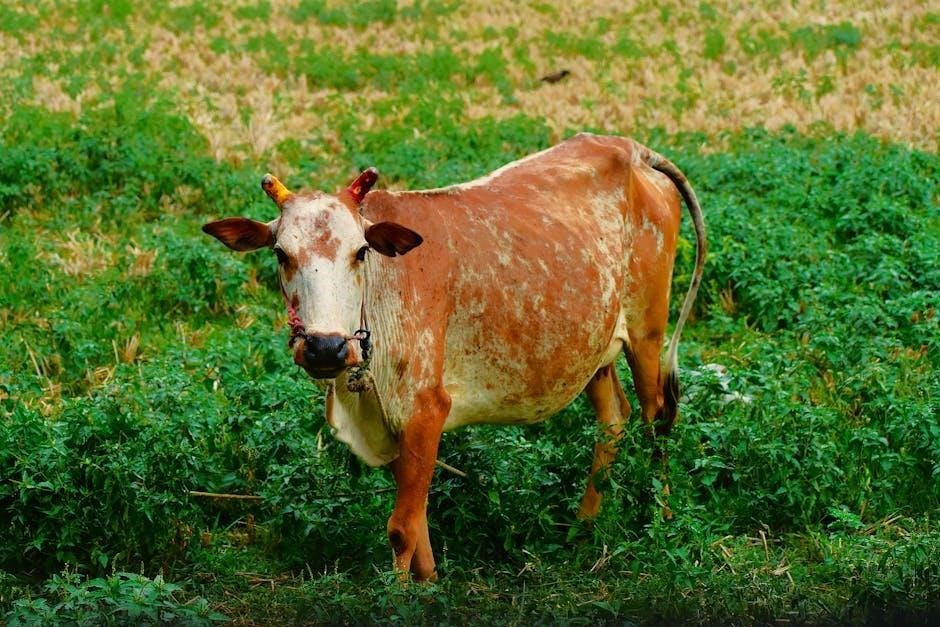
This Animal Farm study guide provides a comprehensive overview of George Orwell’s novella, offering questions and answers for each chapter․ It helps students analyze themes, characters, and symbolism, making it an essential resource for understanding the allegory․ Available as a PDF, it’s perfect for exam preparation and deeper literary insight․
1․1 Importance of Study Guides for Understanding Animal Farm
Study guides are essential for deeply understanding Animal Farm, as they break down complex themes, characters, and historical connections․ They provide structured questions and answers for each chapter, helping students analyze Orwell’s allegory effectively․ A PDF study guide offers a concise and accessible format, making it easier to prepare for exams and grasp the novella’s critical themes, such as power and corruption․
1․2 Overview of the Book and Its Relevance
Animal Farm, a novella by George Orwell, is an allegorical tale reflecting the Russian Revolution and its aftermath․ The story follows farm animals rebelling against their oppressive owner, exploring themes of power, corruption, and betrayal; This book remains highly relevant today, offering insights into human nature and political systems․ A PDF study guide with questions and answers enhances understanding, making it a valuable educational resource for analyzing Orwell’s timeless classic․

Key Themes in Animal Farm
Animal Farm explores themes of power, corruption, and betrayal, highlighting how authority can be misused․ These ideas are central to Orwell’s novella, offering timeless insights into human nature and societal structures․
2․1 The Allegory of the Russian Revolution
Animal Farm serves as a powerful allegory for the Russian Revolution, with Orwell simplifying complex historical events․ The novel mirrors the rise of Stalin, the betrayal of ideals, and the corrupting influence of power․ Characters like Napoleon and Snowball represent historical figures, while events like the rebellion against Mr․ Jones symbolize the overthrow of the Tsar․ Study guides and PDFs help students analyze these parallels, offering questions and answers to deepen understanding of Orwell’s critique of totalitarianism and its relevance to the Russian Revolution’s aftermath․
2․2 Power, Corruption, and Betrayal
Animal Farm explores the destructive nature of power and corruption, as seen in Napoleon’s rise to dominance․ His manipulation of the Seven Commandments and betrayal of the animals’ trust illustrate Orwell’s critique of authoritarianism․ The pigs’ gradual embrace of human-like behavior symbolizes the corrupting influence of power, leading to the farm’s downfall․ Study guides and PDF resources provide questions and answers to analyze these themes, offering insights into the novel’s warning against unchecked authority and betrayal of ideals․
Major Characters and Their Significance
Animal Farm revolves around key characters like Old Major, Napoleon, and Boxer, each symbolizing distinct roles in the allegory․ Study guides and PDFs provide questions and answers to analyze their significance, revealing how their actions and traits shape the novel’s themes and moral lessons․
3․1 Old Major: The Catalyst for Rebellion
Old Major, a wise boar, sparks the rebellion with his inspiring speech about unity and rebellion against humans․ His principles, like “All Animals Are Equal,” become the foundation of Animalism․ Study guides highlight his significance, with questions and answers exploring his role in motivating the animals․ His death emphasizes the loss of idealism, leaving the farm vulnerable to corruption․ PDF resources delve into his symbolic importance and legacy․
3․2 Boxer: The Embodiment of Loyalty and Dedication
Boxer, a strong and loyal horse, represents unwavering dedication to the farm’s cause․ His motto, “I will work harder,” reflects his commitment․ Study guides highlight his tragic fate, as his exploitation and eventual collapse symbolize the consequences of blind loyalty․ Questions and answers in PDF resources explore his character, emphasizing his role as a symbol of the working class and the devastating effects of betrayal and corruption․
Chapter-Wise Questions and Answers
This section provides a detailed breakdown of questions and answers for each chapter of Animal Farm․ It helps students understand key events, themes, and character motivations, making it ideal for exam preparation and deeper comprehension of the novella․
These questions explore the opening chapter, focusing on the animals’ gathering and Old Major’s speech․ They help students understand the initial motivations and setting of the story․
- Why do the animals gather in the barn, and what does this reveal about their unity?
- What is the significance of Old Major’s role, and why is his speech important?
- What are the key points of Old Major’s speech, and how do they influence the animals?
- What does the term “Beasts of England” signify, and how does it unify the animals?
4․2 Answers to Key Questions in Chapter 1
This section provides detailed answers to Chapter 1 questions, enhancing understanding of the plot and characters․ Old Major’s speech emphasizes unity and rebellion against oppression, inspiring the animals to envision a better future․ The gathering in the barn symbolizes their collective desire for change, while “Beasts of England” serves as a unifying anthem, reflecting their shared aspirations for freedom and equality․
Symbolism in Animal Farm
Animal Farm is rich in symbolism, with characters and events representing real-world themes and historical contexts․ The barn symbolizes unity, while “Beasts of England” embodies rebellion and hope, reflecting Orwell’s use of allegory to critique societal structures and political corruption․
5․1 The Meaning Behind “Beasts of England”
“Beasts of England” is a powerful anthem in Animal Farm that symbolizes rebellion and unity among the animals․ It represents the hope for a better future, free from oppression, and serves as a call to action against tyranny․ The song’s suppression later in the story mirrors the corruption of ideals, highlighting Orwell’s critique of power and its misuse, central to the novella’s themes․
5;2 The Role of the Barn as a Symbol of Unity
The barn in Animal Farm symbolizes unity and collective effort, serving as the gathering place for the animals to discuss and decide their future․ It represents the shared goals and solidarity of the animals, emphasizing teamwork and equality․ Over time, the barn becomes a reminder of their initial unity, contrasting with the eventual corruption and division that arise, highlighting Orwell’s exploration of power dynamics and societal fragmentation․

The Russian Revolution and Its Connection to Animal Farm
Animal Farm mirrors the Russian Revolution, with characters and events symbolizing real historical figures and occurrences․ Orwell crafted this allegory to critique the revolution’s corruption, making it universally relatable․
6․1 Historical Context of the Russian Revolution
The Russian Revolution began in 1917, overthrowing the monarchy and establishing the Soviet Union․ Lenin led the Bolsheviks to power, later succeeded by Stalin, whose regime became increasingly oppressive․ This historical backdrop inspired Orwell to create Animal Farm, using the allegory to critique the revolution’s ideals and their corruption․ The study guide provides insights into these parallels, aiding students in understanding the novel’s deeper meaning․
6․2 How Animal Farm Mirrors the Revolution
Animal Farm mirrors the Russian Revolution through its characters and events․ The overthrow of Mr․ Jones symbolizes the fall of the Tsar, while Napoleon and Snowball represent Stalin and Trotsky․ The corruption of power among the pigs reflects the Soviet regime’s decline into totalitarianism․ This allegory allows readers to understand the revolution’s ideals and their tragic distortion, as explored in the study guide’s questions and answers․

Study Guide for Animal Farm PDF
The Animal Farm PDF study guide offers a detailed, chapter-by-chapter analysis, including summaries, key questions, and answers․ It’s an invaluable resource for students to grasp themes, characters, and symbolism effectively․
7․1 How to Use the PDF for Effective Studying
To maximize the benefits of the Animal Farm PDF study guide, start by skimming the table of contents to understand the structure․ Focus on chapter summaries for a quick overview, then dive into questions and answers to test your knowledge․ Highlight key themes and symbols for better retention․ Use the guide alongside the novel for cross-referencing and deeper analysis․ Its portability makes it ideal for studying on the go, ensuring you’re always prepared for exams or discussions․
- Review summaries for a quick overview․
- Engage with questions to test understanding․
- Highlight key themes and symbols․
- Use it alongside the novel for cross-referencing․
- Take advantage of its portability for on-the-go study․
7․2 Benefits of Using a Summarized Study Guide
A summarized Animal Farm study guide saves time by condensing key points into an easy-to-read format․ It focuses on important themes, characters, and symbols, ensuring clarity and improved retention․ The concise structure helps students quickly grasp essential concepts, while the inclusion of questions and answers reinforces understanding․ This tool is ideal for exam preparation, providing a portable and efficient way to review the novella’s core elements effectively․

Common Exam-Style Questions
This section provides exam-style questions on Animal Farm, covering key themes, characters, and plot points․ It prepares students for assessments by mirroring real exam formats and expectations․
8․1 Sample Questions for AQA Exams
These sample questions are designed to mirror AQA exam formats, focusing on themes like power, betrayal, and the allegory of the Russian Revolution․ Questions include analyzing Napoleon’s leadership, Snowball’s expulsion, and the moral implications of the pigs’ actions․ Students are also asked to evaluate Orwell’s use of symbolism and how it reinforces the novella’s themes․ The guide provides answers aligned with the mark scheme to help students achieve higher grades․
8․2 How to Structure Your Answers for Maximum Marks
To achieve top marks, ensure your answers are clear, focused, and evidence-based․ Begin with a strong thesis statement, followed by relevant examples from the text․ Use quotes to support your analysis and explain their significance․ Organize your response logically, addressing all parts of the question․ Understand the mark scheme and align your answer to meet its criteria․ Practice timing and concise writing to cover all points effectively․
Text-Dependent Questions for Each Chapter
This section provides text-dependent questions for each chapter of Animal Farm, encouraging critical analysis and deeper understanding of the plot, themes, and characters․ The PDF guide offers detailed insights and answers to enhance comprehension․
9․1 Questions to Deepen Understanding of the Plot
These text-dependent questions focus on key plot points, encouraging students to analyze events, characters, and motivations․ Examples include: “Why do the animals gather in the barn?” and “How does Boxer’s character influence the rebellion?” Such questions help students engage critically with the story, exploring themes like loyalty and power․ The PDF guide provides answers to support deeper comprehension and discussion․
9․2 Answers to Enhance Critical Thinking
The answers in this section are designed to encourage deeper analysis of Animal Farm․ They provide insights into character motivations, such as Boxer’s unwavering loyalty, and explore symbolic elements like the barn as a unifying force․ By addressing questions about power dynamics and moral dilemmas, these answers help students develop a nuanced understanding of Orwell’s allegory, fostering critical thinking and analytical skills․
This Animal Farm study guide equips students with essential tools for understanding Orwell’s timeless allegory․ The PDF resource offers detailed insights, fostering critical thinking and a deeper appreciation of the novella’s themes, such as power and corruption, ensuring a comprehensive learning experience․
10․1 The Value of Animal Farm in Modern Education
Animal Farm remains a vital tool in modern education, offering insights into political satire, morality, and historical context․ Its universal themes, such as power dynamics and corruption, resonate with students, fostering critical thinking․ The PDF study guide enhances learning by providing structured questions and answers, enabling deeper analysis of Orwell’s allegory and its relevance to contemporary societal issues․
10․2 Encouraging Further Reading and Analysis
Engaging with Animal Farm beyond the classroom fosters a deeper understanding of its themes and historical context․ Encourage students to explore additional resources, such as the PDF study guide, to analyze complex ideas․ Discussing questions and answers in groups can spark critical thinking and inspire readers to connect the story’s lessons to real-world issues, promoting lifelong learning and intellectual curiosity․
